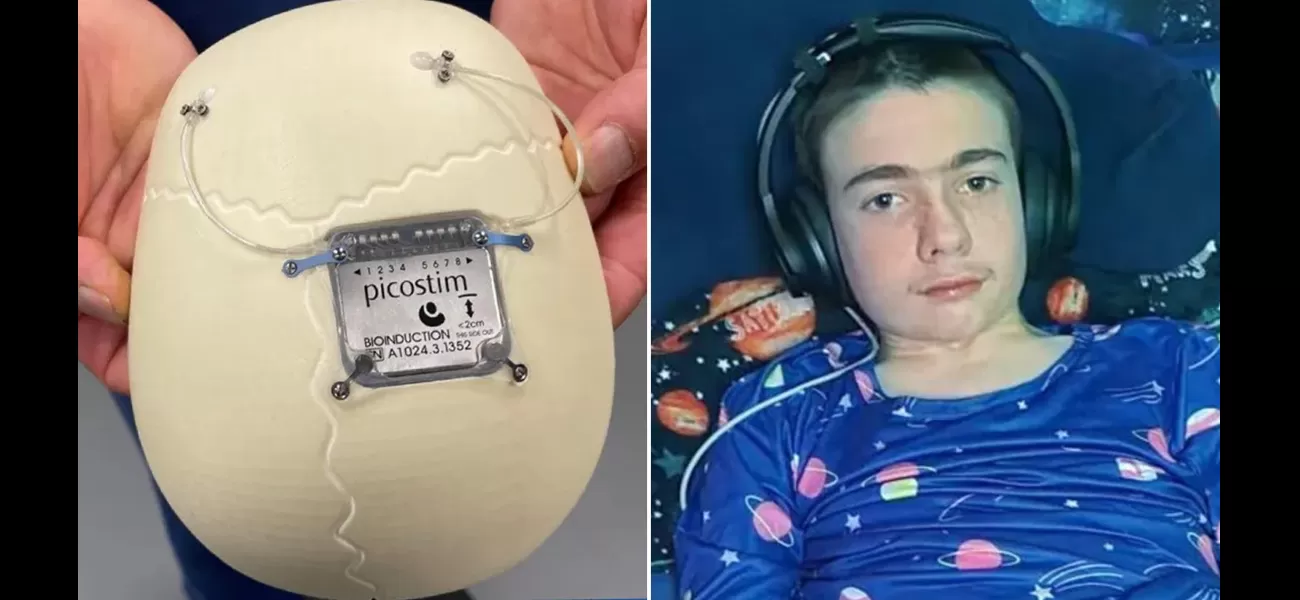First person with epilepsy fitted with seizure-controlling device.
Mother says son's epilepsy stole his childhood.
June 24th 2024.

Oran, a 13-year-old boy from Somerset, has been struggling with severe epilepsy since he was three years old. His condition, known as Lennox-Gastaut syndrome, is resistant to traditional treatments and has greatly impacted his daily life. He used to experience several seizures every day, some of which were so intense that he would lose consciousness and require emergency medication to be resuscitated. His mother, Justine, described how his epilepsy dominated his life and took away his childhood.
However, Oran recently became the first patient in the world to receive a new device fitted to his skull that has greatly improved his condition. This neurostimulator, which sends electrical signals deep into his brain, has reduced his daytime seizures by 80%. Justine shared with the BBC that since the device was fitted, Oran has been much happier and has a "much better quality of life." This is a huge relief for his family, as his epilepsy had been a constant source of worry and stress.
Oran's surgery, which took place in October at Great Ormond Street Hospital in London, was part of a trial for the Picostim neurotransmitter. The device emits a constant pulse of current that aims to disrupt the abnormal signals in Oran's brain that trigger seizures. This is a groundbreaking approach, as seizures occur when there are abnormal bursts of electrical activity in the brain. Oran's epilepsy was so severe that it even affected his breathing at times, making it a life-threatening condition.
The surgery involved inserting two electrodes deep into Oran's brain, with a margin of error of less than a millimeter. These electrodes were connected to a small neurostimulator, which was placed in a gap in Oran's skull and anchored in place. This is the first time neurostimulators have been placed directly into the brain, as previous attempts at deep brain stimulation for childhood epilepsy involved placing the device in the chest with wires running up to the brain. Martin Tisdall, the lead surgeon, explained that this new approach is particularly beneficial for children, as it reduces the potential complications.
Since the device is placed in Oran's skull, he cannot feel it when it is on. He can recharge it every day using wireless headphones, allowing him to go about his daily life without any interruptions. Justine expressed her excitement for the next phase of the trial, where three more children with Lennox-Gastaut syndrome will be fitted with the deep brain neurostimulator. She believes that this new treatment has given her son hope and a brighter future.
The CADET project, external – a series of trials assessing the safety and effectiveness of deep brain stimulation for severe epilepsy – has given Oran and his family newfound hope. Justine shared that she wants her son to "find some of himself again through the haze of seizures" and get back to being the happy, carefree boy he used to be. The team at Great Ormond Street Hospital is thrilled with the success of Oran's surgery and is hopeful that it will pave the way for more effective treatments for severe epilepsy in the future.
However, Oran recently became the first patient in the world to receive a new device fitted to his skull that has greatly improved his condition. This neurostimulator, which sends electrical signals deep into his brain, has reduced his daytime seizures by 80%. Justine shared with the BBC that since the device was fitted, Oran has been much happier and has a "much better quality of life." This is a huge relief for his family, as his epilepsy had been a constant source of worry and stress.
Oran's surgery, which took place in October at Great Ormond Street Hospital in London, was part of a trial for the Picostim neurotransmitter. The device emits a constant pulse of current that aims to disrupt the abnormal signals in Oran's brain that trigger seizures. This is a groundbreaking approach, as seizures occur when there are abnormal bursts of electrical activity in the brain. Oran's epilepsy was so severe that it even affected his breathing at times, making it a life-threatening condition.
The surgery involved inserting two electrodes deep into Oran's brain, with a margin of error of less than a millimeter. These electrodes were connected to a small neurostimulator, which was placed in a gap in Oran's skull and anchored in place. This is the first time neurostimulators have been placed directly into the brain, as previous attempts at deep brain stimulation for childhood epilepsy involved placing the device in the chest with wires running up to the brain. Martin Tisdall, the lead surgeon, explained that this new approach is particularly beneficial for children, as it reduces the potential complications.
Since the device is placed in Oran's skull, he cannot feel it when it is on. He can recharge it every day using wireless headphones, allowing him to go about his daily life without any interruptions. Justine expressed her excitement for the next phase of the trial, where three more children with Lennox-Gastaut syndrome will be fitted with the deep brain neurostimulator. She believes that this new treatment has given her son hope and a brighter future.
The CADET project, external – a series of trials assessing the safety and effectiveness of deep brain stimulation for severe epilepsy – has given Oran and his family newfound hope. Justine shared that she wants her son to "find some of himself again through the haze of seizures" and get back to being the happy, carefree boy he used to be. The team at Great Ormond Street Hospital is thrilled with the success of Oran's surgery and is hopeful that it will pave the way for more effective treatments for severe epilepsy in the future.
[This article has been trending online recently and has been generated with AI. Your feed is customized.]
[Generative AI is experimental.]
0
0
Submit Comment





